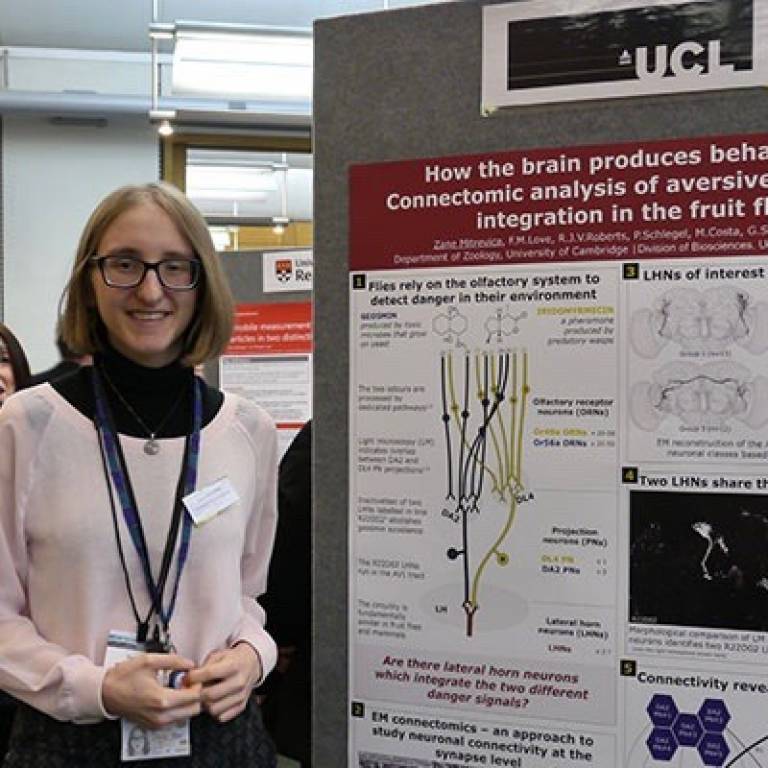Seven questions with Zane Mitrevica
22 February 2018
This week, we speak to Zane Mitrevica, a third year Neuroscience student from Latvia, who presented her undergraduate research project to policy makers at the Houses of Parliament this week.

1. Why are you interested in Neuroscience and what do you plan to do in the future?
The questions investigated by neuroscientists deal with the most fundamental aspects of what many of us associate with being human. From perception and judgment to highly coordinated movement, I think it is absolutely fascinating that behind all of these processes lie thousands of incredibly fast neuronal communication events which must occur in exactly the right pattern to produce a desired action. In order to work on solving some of the many remaining mysteries of the brain, I hope to do a PhD after graduation, and contribute to our understanding of the cellular and network processes underlying behaviour.
2. What is the most interesting thing you've done, seen or got involved with while at UCL?
Without doubt, it is getting to showcase my research in the Houses of Parliament after winning the first prize in the 'Posters in Parliament' selection round at UCL, Posters in Cloisters.
As part of the annual British Conference of Undergraduate Research, 'Posters in Parliament' brings together around 40 students from across the UK to present their work at the iconic site of Westminster. Last summer, I did an exciting research project on olfactory perception in fruit flies, working in the lab of Dr Gregory Jefferis and the Drosophila Connectomics group at the University of Cambridge as part of the Amgen Scholars Programme. 'Posters in Parliament' - and the UCL selection round called 'Posters in Cloisters' - seemed like an amazing opportunity to share the work I had done with the wider public. Having learned about this event from the weekly newsletter, I also viewed it as a useful challenge to make and present a scientific poster for a not-necessarily-scientific audience.
Although winning the selection round was rather unexpected, being able to represent UCL at this prestigious event was, of course, a great honour. I thoroughly enjoyed communicating my science to people of various positions, including MPs. Seeing them learn something new from my presentation was very rewarding, especially because condensing scientifically detailed information into something that everyone can benefit from is not as easy as it might seem. In fact, I feel that an ability to modify my presentation on the spot based on the particular listener is my most important takeaway from this great experience.
To anyone planning to do research and thinking about participating next year (next round starts in November 2018), I would certainly recommend it. The good thing about 'Posters in Parliament' is that undergraduates from any discipline are eligible, and it is a great way to develop many transferable skills.
3. Have you discovered any 'hidden gems' during your time at UCL?
At least within the Division of Biosciences, a 'gem' that is openly advertised but still gets hidden among everything else going on at UCL is the weekly departmental research seminars. Although most people there are professors, post-docs or graduate students in the particular field, no-one objects to an undergraduate listening to the talk and perhaps even asking questions.
4. Give us your top three things to do/see/go to in London
1. For all science junkies out there, I would definitely recommend visiting the Royal Society Library. Their remarkable collection includes Sir Isaac Newton's death mask, Darwin's original 'On the origin of species', and the signatures of many past and present greats, all in one (very thick) book.
2. Going to the Madame Tussauds is also a fun adventure, with the added bonus of it having 221B Baker Street just around the corner.
3. Lastly, I think that the many parks and squares of London also deserve more appreciation.
5. If you were Provost for the day, what one thing would you do?
I would organise interdisciplinary workshops, bringing together experimentalists and theoreticians from fields as diverse as molecular biology and physics, and have them learn about the questions the others are trying to solve. I believe that facilitating the exchange of ideas across fields is key to driving innovation. After all, some of the most influential technological and conceptual advances in the past have come from people switching fields and applying their previous expertise to new challenges.
6. Who inspires you and why?
Naming a single person would be impossible as I tend to draw inspiration from different people, and often whole groups of people, every day. As a general example, I am inspired by the growing community of scientists who publish their manuscripts, lab protocols and code on openly accessible platforms, standing against corruption in academia.
7. What would it surprise people to know about you?
Perhaps that my name does NOT rhyme with 'rain'? Contrary to what people often assume without asking, my name is actually pronounced /zanɛ/, and not /zeɪn/.
Apart from that - I suppose it might be surprising that I genuinely enjoy giving presentations in front of large audiences, even though I am not the most flamboyant person. Somehow, when given an opportunity to speak about a topic I know and care about, I find the experience quite thrilling and enjoyable.
 Close
Close

